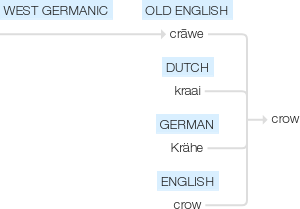Crow
Old English crāwe, of West Germanic origin; related to Dutch kraai and German Krähe, also to crow2.
wiktionary
From Middle English crowe, from Old English crāwe, from Proto-Germanic *krāwō (compare West Frisian krie, Dutch kraai, German Krähe), from *krāhaną ‘to crow’. See below.
Middle English crowen, from Old English crāwan (past tense crēow, past participle crāwen), from Proto-Germanic *krēaną, from imitative Proto-Indo-European *gerH-(“to cry hoarsely”). [1]
Compare Dutch kraaien, German krähen, Lithuanian gróti, Russian гра́ять(grájatʹ)). Related to croak.
etymonline
crow (n.)
general common name of birds of the genus Corvus (the larger sort being sometimes called ravens), Old English crawe, which is held to be imitative of the bird's cry. Compare Old Saxon kraia, Dutch kraai, Old High German chraja, German Kräke.
Noted for sagacity and sociability. The British and North American species are very similar. Phrase as the crow flies "in a straight line" is from 1810; the image is attested in different form from 1800.
American English figurative phrase eat crow "do or accept what one vehemently dislikes and has opposed defiantly, accept things which, though not unbearable, are yet scarcely to be wished for," is attested by 1870 (originally often eat boiled crow), and seems to be based on the notion that the bird is edible when boiled but hardly agreeable.
There was an oft-reprinted mid-19c. joke about a man who, to settle a bet that he could eat anything, agrees to eat a boiled crow. As he with great difficulty swallows the first to mouthfuls, he says to the onlookers, "I can eat crow, but I don't hanker arter it." The joke is attested by 1854 (Walter Etecroue turns up 1361 in the Calendar of Letter Books of the City of London).
I tried my best to eat crow, but it was too tough for me. "How do you like it?" said the old man, as, with a desperate effort, he wrenched off a mouthful from a leg. "I am like the man," said I, "who was once placed in the same position: 'I ken eat crow, but hang me if I hanker arter it.'" "Well," says the captain, "it is somewhat hard; but try some of the soup and dumplings and don t condemn crow-meat from this trial, for you shot the grandfather and grandmother of the flock: no wonder they are tough; shoot a young one next time." "No more crow-meat for me, thank you," said I. [James G. Swan, "The Northwest Coast, or Three Years' Residence in Washington Territory," New York, 1857]
The image of a crow's foot for the wrinkles appearing with age at the corner of the eye is from late 14c. ("So longe mote ye lyve Til crowes feet be growen under youre ye." [Chaucer, Troilus and Criseyde, c. 1385]).
crow (v.)
Old English crawan "make a loud noise like a crow," probably imitative (see crow (n.)). Compare Dutch kraaijen, German krähen. From mid-13c. as "make a loud noise like a cock," which oddly has become the main sense, the use of the word in reference to crows (and cranes) having faded. Sense of "exult in triumph" is from 1520s, probably an image of the cock's crow, but perhaps also in part because the English crow is a carrion-eater. Related: Crowed; crowing. As a noun, "characteristic cry of the cock," also "the crowing of the cock at dawn," c. 1200.
Crow
Indian tribe of the American Midwest, the name is a rough translation of their own name, Apsaruke.
